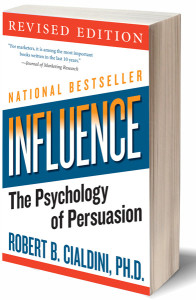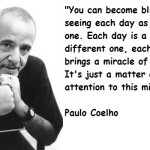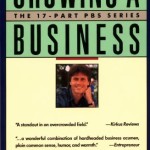Dr.
Robert Cialdini has spent his entire career researching the science of influence earning him an international reputation as an expert in the fields of persuasion, compliance, and negotiation.His books including, Influence: Science & Practice, are the result of decades of peer-reviewed research on why people comply with requests. Influence has sold over 2 million copies, is a New York Times Bestseller and has been published in twenty-seven languages.
Because of the world-wide recognition of Dr. Cialdini’s cutting edge scientific research and his ethical business and policy applications, he is frequently regarded as the “Godfather of influence.”
“A well-known principle of human behavior says that when we ask someone to do us a favor we will be more successful if we provide a reason. People simply like to have reasons for what they do.” ― Robert B. Cialdini
6 key principles of influence by Robert Cialdini
- Reciprocity – People tend to return a favor, thus the pervasiveness of free samples in marketing. In his conferences, he often uses the example of Ethiopia providing thousands of dollars in humanitarian aid to Mexico just after the 1985 earthquake, despite Ethiopia suffering from a crippling famine and civil war at the time. Ethiopia had been reciprocating for the diplomatic support Mexico provided when Italy invaded Ethiopia in 1935. The good cop/bad cop strategy is also based on this principle.
- Commitment and Consistency – If people commit, orally or in writing, to an idea or goal, they are more likely to honor that commitment because of establishing that idea or goal as being congruent with their self-image. Even if the original incentive or motivation is removed after they have already agreed, they will continue to honor the agreement. Cialdini notes Chinese brainwashing on American prisoners of war to rewrite their self-image and gain automatic unenforced compliance. See cognitive dissonance.
- Social Proof – People will do things that they see other people are doing. For example, in one experiment, one or more confederates would look up into the sky; bystanders would then look up into the sky to see what they were seeing. At one point this experiment aborted, as so many people were looking up that they stopped traffic. See conformity, and the Asch conformity experiments.
- Authority – People will tend to obey authority figures, even if they are asked to perform objectionable acts. Cialdini cites incidents such as the Milgram experiments in the early 1960s and the My Lai massacre.
- Liking – People are easily persuaded by other people that they like. Cialdini cites the marketing of Tupperware in what might now be called viral marketing. People were more likely to buy if they liked the person selling it to them. Some of the many biases favoring more attractive people are discussed. See physical attractiveness stereotype.
- Scarcity – Perceived scarcity will generate demand. For example, saying offers are available for a “limited time only” encourages sales.
[From Wikipedia]
If you like this story, CLICK HERE to join the tribe of success-minded people just like you. You will love our weekly quick summaries of top stories, talks, books, movies, music and more with handy downloadable guides, cheat sheets, cliffs notes and quote books.
And, you can opt-out at any time – no strings, promise… CLICK HERE

















